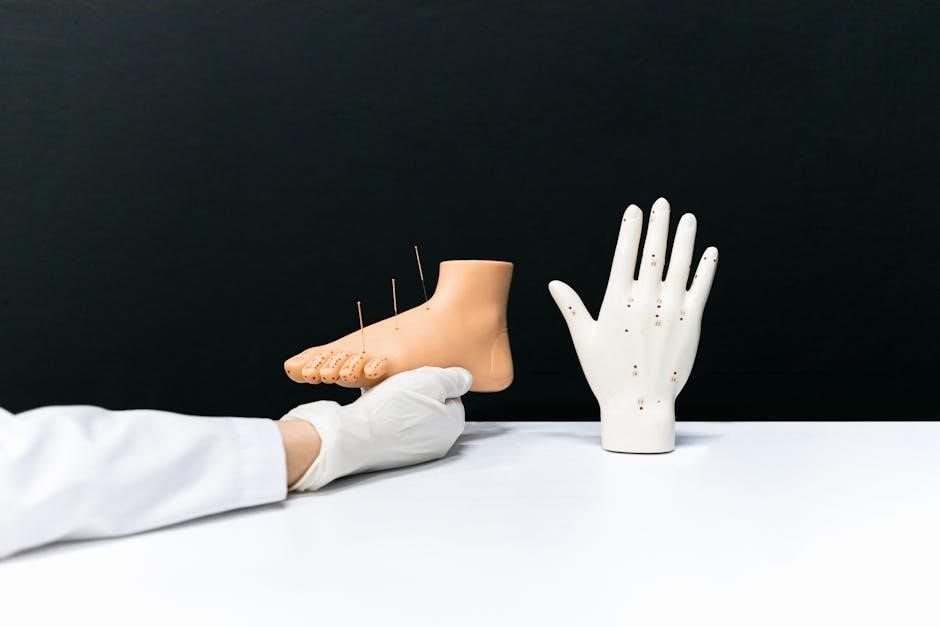Integrative manual therapy training combines traditional methods with advanced diagnostic technologies, providing a comprehensive approach to patient care, using various techniques and tools to assess and treat dysfunction, within a holistic framework always.
Definition and Overview
Integrative manual therapy training is a holistic approach to patient care, focusing on the interconnectedness of the body’s systems. This approach combines traditional manual therapy techniques with advanced diagnostic technologies to provide a comprehensive understanding of the patient’s condition. The training program is designed to empower therapists with the skills and knowledge necessary to assess and treat dysfunction from a whole-body perspective. By leveraging advanced diagnostic technologies, therapists can gain a deeper understanding of the underlying causes of pain and dysfunction, and develop effective treatment plans to address these issues. The goal of integrative manual therapy training is to provide therapists with the tools and expertise necessary to deliver high-quality patient care, and to promote optimal health and well-being. This approach recognizes the complex interrelationships between the body’s systems, and seeks to address the root causes of dysfunction, rather than just treating symptoms.

Programs and Certifications
Various programs offer certifications in integrative manual therapy, providing therapists with specialized training and expertise always available online.
Certified Integrated Manual Therapist Program
The Certified Integrated Manual Therapist program is a comprehensive training program designed to equip therapists with the skills and knowledge needed to assess and treat patients using an integrative approach. This program focuses on whole-body perspective, connecting the dots between the driver of pain and symptoms. The program uses an eclectic manual therapy approach, combining traditional methods with advanced techniques to provide effective treatment. By completing this program, therapists can gain the expertise needed to provide high-quality patient care. The program is designed to create a roadmap towards becoming a great manual therapist, with a focus on clinical practicum and hands-on training. The Certified Integrated Manual Therapist program is recognized by reputable organizations, providing therapists with a certified credential that demonstrates their expertise in integrative manual therapy. This program is an essential step for therapists looking to advance their skills and provide exceptional patient care.

Continuing Education and Training
Therapists engage in ongoing education and training, enhancing skills and knowledge, to provide optimal patient care, with updated methods always.
Mastery Certification in Manual Therapy
The Mastery Certification in Manual Therapy is a comprehensive program designed to equip therapists with advanced skills and knowledge in manual therapy. This program offers a range of courses and training sessions, focusing on the most effective and widely used manual therapy techniques. Upon completion of the program, therapists will be awarded a certification, recognizing their expertise in manual therapy. The program is designed to be flexible, allowing therapists to complete the courses at their own pace. The Mastery Certification in Manual Therapy is a valuable asset for any therapist looking to enhance their skills and provide optimal patient care. The program covers a range of topics, including manual therapy methodologies, diagnostic tests, and treatment techniques. By completing this program, therapists will be able to provide evidence-informed care, using the latest techniques and technologies. This certification is a testament to a therapist’s commitment to excellence in manual therapy.

Diagnostic Technologies and Tools
Advanced diagnostic tools like Electromyography and MSK Ultrasound Imaging enhance patient care and treatment outcomes always effectively.
Leveraging Advanced Diagnostic Technologies
Integrative manual therapy training incorporates advanced diagnostic technologies to enhance treatment outcomes.
These technologies include Electromyography, Nerve Conduction Studies, and MSK Ultrasound Imaging, which provide valuable insights into patient conditions.
By leveraging these technologies, therapists can develop more effective treatment plans, improving patient care and outcomes.
The use of advanced diagnostic technologies also enables therapists to monitor patient progress, making adjustments to treatment plans as needed.
This approach ensures that patients receive the most effective and efficient care possible, leading to better overall health and well-being.
The integration of advanced diagnostic technologies into manual therapy training is a key component of comprehensive patient care, and is essential for therapists seeking to provide the highest level of care.
By staying up-to-date with the latest advancements in diagnostic technologies, therapists can ensure that their patients receive the best possible treatment, and that they remain at the forefront of their field.

Benefits and Membership
Monthly membership enhances affordability, providing access to continuing education credits and certification, with cancel anytime flexibility always available online.
Earning Continuing Education Credits and Certification
Earning continuing education credits and certification is a crucial aspect of integrative manual therapy training, as it ensures that therapists stay updated on the latest techniques and methodologies. The certification process typically involves completing a series of courses and passing an examination. Upon completion, therapists can earn continuing education credits, which are essential for maintaining their professional licenses. Many organizations offer certification programs, and some even provide online courses and membership options to make it more accessible. These programs often include a range of topics, from manual therapy techniques to advanced diagnostic technologies. By earning certification, therapists can demonstrate their expertise and commitment to their profession, which can lead to improved patient outcomes and increased job satisfaction. Overall, earning continuing education credits and certification is an important investment for therapists who want to advance their careers and provide the best possible care for their patients. Therapists can choose from various certification options.
